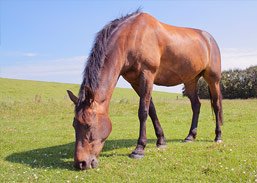Often times during appointments I am asked questions about the nutrition of my client’s horses. Usually the conversation goes something like this. “Hey doc what should I be feeding my horse?” I first respond by asking what they are currently feeding. The answers sometimes surprise me, but when you are taking nutrition advise from the farrier, the boarder in the next stall, the internet, your sister who once owned horses, and the 18 year old girl working the cash register at the feed store, and combine all of that information to formulate your horses feed I will often times get this response. “ Well doc I give him two flakes of alfalfa for breakfast along with his hoof supplement, his coat supplement, his joint supplement, his vitamin and mineral supplement, a scoop of beet pulp, a scoop of rice bran, a scoop of oats, and a bucket or senior grain, because he really likes it. Then for lunch he gets a flake of Bermuda, and for dinner he gets a flake of orchard and a flake of alfalfa with a little senior feed.” I then ask is there anything else? “Oh yeah, I also give him carrots and apples every day when I come out to ride him and brush him.” I then begin to understand why the horse looks like the stay puff marshmallow man that is ready to jump out of his skin. He is over fed, overweight, under exercised and over loved.
To simplify equine nutrition you need to understand a few key terms. One is Roughage. This is any type of hay, grass, or hay pellet that cannot be broken down with simple digestion of the stomach and small intestine. These feed stuffs are broken down by bacteria in the large intestine and the cecum. Roughage should be the majority of any equine diet. The second is concentrate feed. These are feeds such as cereal grains which can be easily broken down by the stomach and small intestine into starch and sugar and absorbed by the small intestine quickly. These feed stuffs should make up a very small percentage of your horses diet, and in some cases your horse should not have any concentrate feed in its diet at all. The third term we will use is supplements. Supplements are used to replace nutrients or trace mineral that may be lacking in a horses diet. If these nutrients are not lacking in your horses diet and you are feeding them vitamin and mineral supplements your horse’s body is most likely getting rid of the excess that it does not need. Most of them are not detrimental to the horse, however there are some that can be detrimental to your horse in excess. They can also be detrimental to your wallet. Before starting a supplement, or some type of concentrate feed such as grain you should consult your veterinarian to find out if your horse really needs that particular supplement.
Supplements do play an integral part in our horse’s health. That is why we have them. There are some horses that need additional calories or nutrient dense feed, because they do not get all of the nutrition they need from hay alone. Some horses have very active lifestyles that require additional nutrients or calories. However nutrition is not a one size fits all science. As a rule of thumb you should be feeding 1.5-2.0% of the horse’s body weight in feed per day. That can be broken up into 2-3 feedings per day. The majority of that feed should be hay or forage (95-100%). If your horse has a relatively sedentary life style as many horses in the U.S. do, this should be adequate. However if your horse is worked 5-6 days a week or is not maintaining adequate weight on that diet changes will need to be made to increase the horse’s caloric intake. If your horse continues to lose weight or gain weight even with diet changes you need to consult your veterinarian to determine if there is an underlying cause for the change in weight.
I find that equine nutrition can be as complicated or as simple as you want to make it. If you use common sense, and remember to consider the source of your equine nutrition advice. Although there are many people willing to give you advice about your horse’s nutrition, few if any of them are qualified to be giving you nutrition advise. If you have specific questions about your horse’s nutrition, please consult with your veterinarian or feed manufacturers who have nutritionists on staff. As I said before, all horses are individuals and nutrition is not a one size fits all solution.

